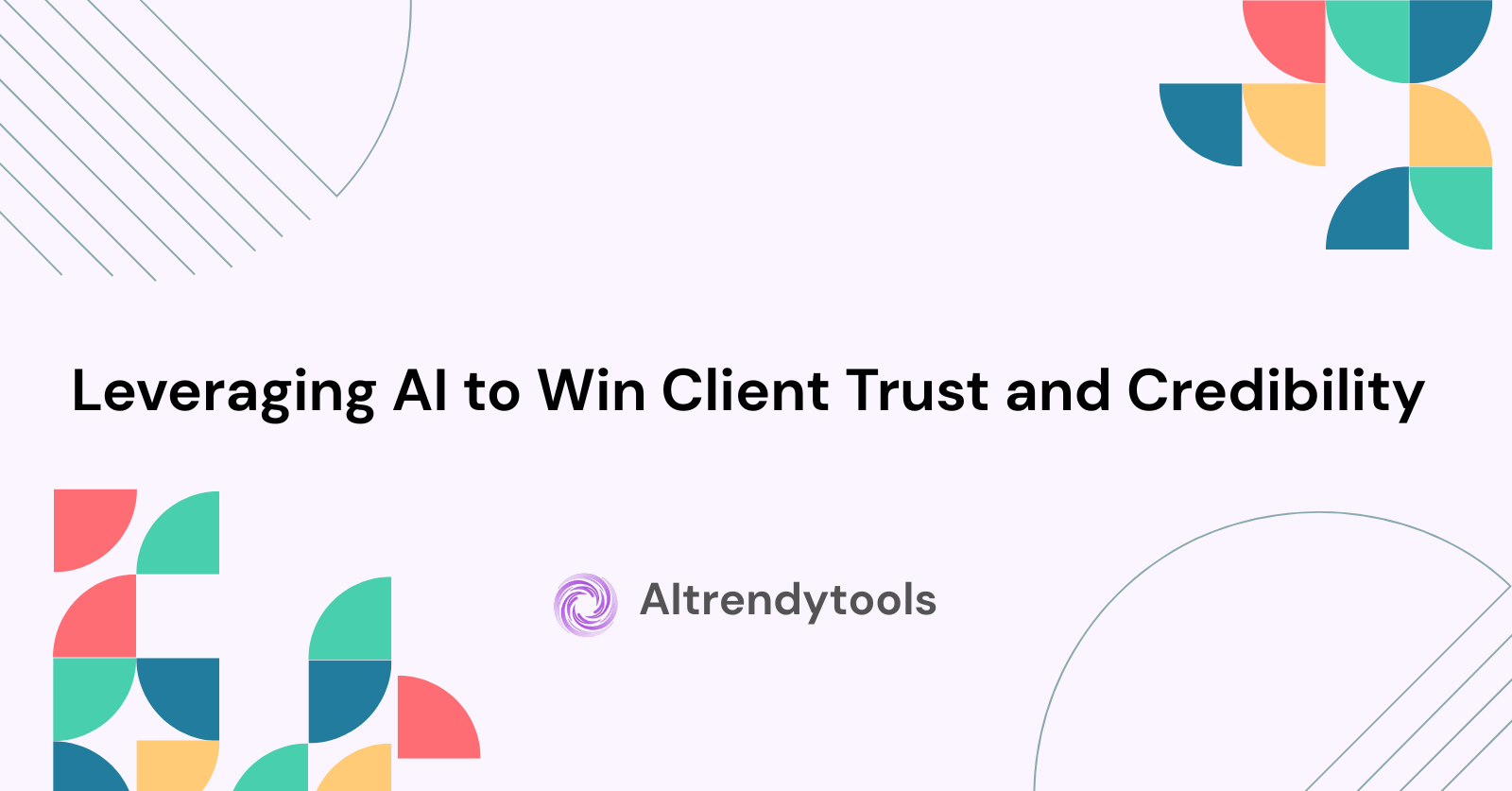🔥 AITrendytools: The Fastest-Growing AI Platform |
Write for usLeveraging AI to Win Client Trust and Credibility
Learn how AI builds client trust through personalization, predictive insights, and ethical use—boosting credibility, communication, and satisfaction.
Jul 28, 2025
Building and maintaining client trust has always been the heart of successful business relationships, but today’s competitive, fast-paced environment demands smarter strategies.
Artificial Intelligence (AI) is emerging as a strong tool to enhance credibility through personalization, predictive insights, and responsiveness that humans can't deliver alone.
From automating client communication to detecting sentiment and tailoring services, AI is reshaping how businesses earn and retain trust. When used ethically and transparently, it can significantly boost a brand’s status and dependability in the eyes of clients.
In this article, we will analyze how AI can be strategically used to win client trust and credibility.
Use AI Tools to Build Fast and Transparent Communication
Clear, timely communication builds client confidence and prevents misunderstandings. AI tools like chatbots, automated emails, and real-time translation enable businesses to respond instantly and consistently.
Gartner forecasts that by 2025, 80% of customer service and support systems will be using generative AI to enhance customer experience (CX). AI is expected to play key roles in content creation, AI-driven chatbots, and automating routine tasks. Its most considerable impact will probably be on improving customer experience.
These tools ensure transparency, reduce delays, and provide clients with accurate updates. This in turn reinforces trust and makes them feel heard, esteemed, and informed at every step.
Add a Personal Touch Through Smart Data Insights
AI analyzes client behavior, preferences, and history to deliver personalized experiences, such as tailored product recommendations, birthday messages, or follow-up emails. This thoughtful use of data adds a personal touch that shows clients they are understood and appreciated. It helps in strengthening emotional connections and long-term loyalty.
The Cisco Consumer Privacy Survey Report of 2023 states that AI offers powerful opportunities to leverage customer data for creating more efficient, personalized experiences. Nearly 48% of surveyed respondents believe AI can positively impact their lives. Also, 54% are willing to share their anonymized personal data to help enhance AI products and improve decision-making.
Demonstrate Efficiency Through Smarter Workflows
Efficiency is a key indicator of professionalism, and AI-powered workflows help businesses showcase their ability to deliver results quickly and accurately. By automating routine tasks, streamlining data analysis, and organizing internal processes, companies can reduce human error and accelerate turnaround times.
Businesses that adopt such systems often appear more capable, dependable, and client-focused. It not only ensures timely updates but also helps manage expectations with clarity and consistency.
For instance, a personal injury lawyer can use AI to track case timelines, assess legal risks, and automate client communications. Clients are more likely to trust a legal professional who demonstrates such precision and believes their case is in skilled and attentive hands.
According to TorHoerman Law, AI can also help personal injury lawyers offer personalized legal representation tailored to each client’s unique needs. It can also support them in a variety of ways throughout the legal procedure.
How do AI-enhanced workflows impact overall client satisfaction?
AI-enhanced workflows improve accuracy, speed, and consistency, with fewer errors and faster service. Clients receive timely updates and personalized attention, which makes them feel valued and informed. This efficiency builds trust, enhances the overall experience, and increases client satisfaction across various touchpoints.
Ensure Accuracy in Every Client Interaction
Accuracy is crucial in every client interaction, as even small errors can damage trust. AI helps ensure precision by automatically checking data, consistent responses, and minimizing human mistakes. From drafting emails to reviewing contracts, AI tools analyze vast amounts of information quickly and reliably.
This leads to clear, fact-based communication that clients can depend on. For example, AI-powered CRMs can pull accurate client histories and preferences in real-time for businesses to respond with context. By ensuring accuracy, AI enhances professionalism and reinforces a company’s credibility in the client’s eyes.
How does AI reduce the risk of human error in client service?
AI reduces human error by automating repetitive tasks, which ensures consistent data handling, and flagging anomalies in real-time. It follows programmed protocols without fatigue or oversight. This leads to fewer mistakes in communication, documentation, and decision-making, ultimately enhancing reliability and client confidence in the service provided.
Show Professionalism with Predictive Support Features
McKinsey reports that about 66% of millennials want instant support when interacting with customer service. Additionally, 75% of all customers expect a consistent experience across different channels.
To meet these rising expectations, companies are increasingly adopting AI to deliver proactive, personalized support. AI-powered customer service boosts engagement, opens doors for cross-sell and upsell opportunities, and lowers service costs.
AI-driven predictive support features, like anticipating client needs or flagging potential issues before they arise, reflect a high level of professionalism. These tools enable proactive service, timely solutions, and personalized recommendations. Clients appreciate the foresight and responsiveness, which strengthens trust and reinforces the business's image as competent and prepared.
Keep Clients Informed About Ethical AI Use
Keeping clients informed about how AI is used ethically is essential to maintaining transparency and trust. Businesses should outline their AI practices in accessible language and address any concerns openly.
UNESCO has partnered with companies developing or using AI across various sectors to form the Business Council for the Ethics of AI. A platform is provided by the Council for the exchange of experiences and the promotion of ethical practices within the AI industry.
Through close cooperation with UNESCO, efforts are made to ensure that AI is developed and applied in ways that respect human rights. Presently, the Council is headed by Telefonica and Microsoft.
How can businesses reassure clients that AI doesn’t replace expert judgment?
Businesses can reassure clients by emphasizing that AI supports, not substitutes, expert decision-making. They should highlight how professionals review AI-generated insights before taking action. Demonstrating a balanced approach where human expertise guides outcomes helps clients trust that technology enhances service without compromising personalized care or critical thinking.
Building Trust in the Age of AI
By integrating AI thoughtfully and ethically, businesses can enhance communication, efficiency, and personalization, key pillars of client trust. When clients see that AI supports expert judgment and improves their experience, credibility naturally follows.
The future of client relationships lies in combining smart technology with genuine human insight.
🚀 Submit Your Tool to Our Comprehensive AI Tools Directory
Get your AI tool featured on our complete directory at AITrendytools and reach thousands of potential users. Select the plan that best fits your needs.





Join 30,000+ Co-Founders
Related Blogs
8 Best AI Logo Generators in 2026
Discover the 8 best AI logo generators in 2026 after testing 30+ tools. See why Design.com ranks #1, followed by BrandCrowd, plus detailed reviews, comparisons, and results.
Design.com: Best AI Design Tool in 2026
Is Design.com the best AI design tool in 2026? We tested its AI logo generator, website builder, business cards, brand kit, and more—read our full in-depth review.
How AI May Change the Future of Online Casinos
Discover how AI is transforming online casinos with personalized gameplay, enhanced security, smarter marketing, and improved player protection.
Submit Your Tool to Our Comprehensive AI Tools Directory
List your AI tool on AItrendytools and reach a growing audience of AI users and founders. Boost visibility and showcase your innovation in a curated directory of 30,000+ AI apps.





Join 30,000+ Co-Founders

